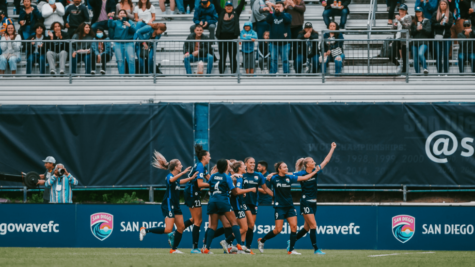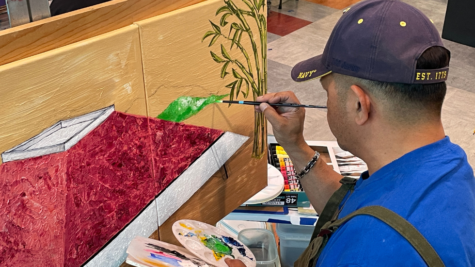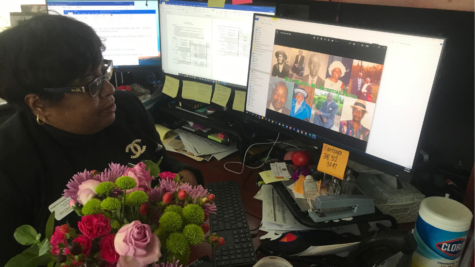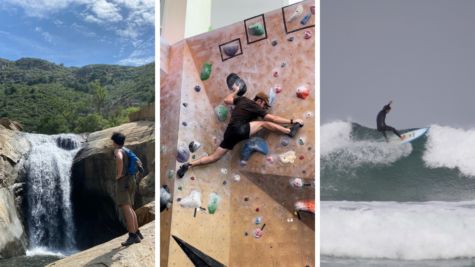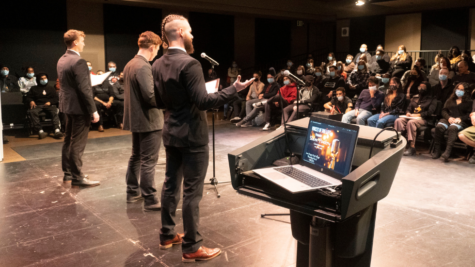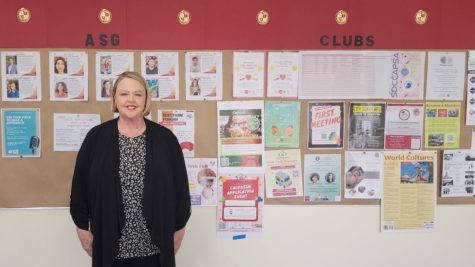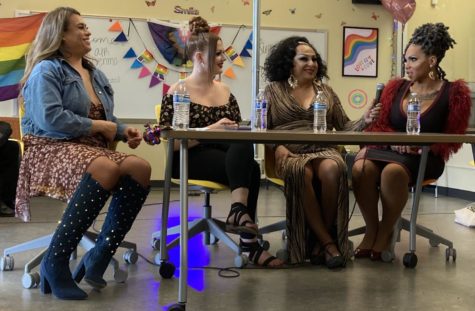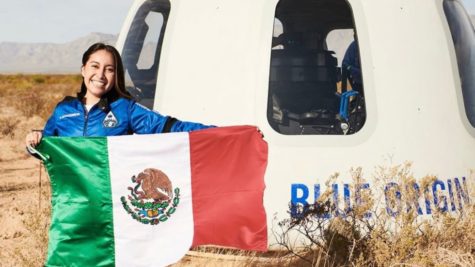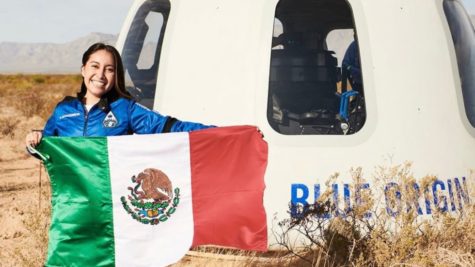Dramas to Hit the Airwaves: Student Radio Brings Back an Old Art Form
The voice actors prepare themselves, doing multiple readings to fine tune the voices they will use for the show. Photo credit: Troy Orem
May 14, 2014
Before the average American household had more TVs than people, radio dramas were a vital part the entertainment industry. They began airing in the 1920s, but were popularized in 1938 when Orson Welles’ adaption of “The War of the Worlds” was aired. The program was so well done that many listeners thought that it was really happening and that the world was under attack by Martians. Though the performance was highly controversial, it remains a landmark in broadcast history because it demonstrated the impact that radio storytelling could have.
San Diego City College students have been hard at work trying to revitalize this old entertainment form by producing radio plays this semester to air on Student-Delivered Sound, or SDS Radio for short.
The idea came from student Bill West, a radio/television student who already has certificates in radio and media performance. He is currently the production manager of SDS Radio, which operates on the HD2 channel of KSDS-FM 88.3.
West says he was inspired by a voice-over class he took last year that had students perform an episode of the classic radio drama series “The Green Hornet,” which first aired in 1936.
“I had wanted to start on these last summer, but I didn’t know about royalties,” he said. “There is a law called fair use of copyrights, so for educational purposes we have to worry about it.”
According to U.S. copyright law, the restrictions on works created before January 1978 depend on multiple factors, which can make things a little confusing.
“One website I came across said they think these copyrights have expired,” West said. “At first, I was thinking we were going to have to write our own to keep from paying royalties, but now that’s not a problem.”
While West said he’s currently too busy to take on writing his own radio drama, he is interested in the possibility of producing something unique if another student wanted to write a script.
“If someone had that desire and wanted to do it, by all means, I’d be glad to work with them,” he said.
In March, he recorded another episode of “The Green Hornet,” as the first production for the SDS radio plays. He held auditions on the porch of the Saville Theatre in the rain, but plenty of people still came out. After hearing the auditions, West sent the chosen actors each an email containing their part, the script, an mp3 file of the original 1939 performance, and one week to prepare.
Since the SDS radio studio consists of a tiny room that used to be a closet in the C building, they had to find another facility to record in. The play was recorded at 760 KFMB-AM radio on Engineer Road. They did the show in two takes, and then West edited and added sound effects later.
West has no plans of making the play available online because he wants listeners to tune in to the radio station to hear it, but he has been holding the show and waiting to air it until he’s worked out all the kinks. He said it’s going to generate some publicity for SDS radio, and he wants everything with the station to be polished before that happens. “You only get one first impression,” he said.
Even though they’ve been shy about promoting themselves, the SDS radio plays are open to any City College student who would like to participate — provided they’re cast by West after an audition.
West said the radio plays are an ongoing project, and that he hopes that students will continue putting them on after he leaves City.
“I hope that even if I don’t continue to produce them, that when I leave I hope to kind of have started something that will go on,” he said. “I do hope to still be here in the fall semester. One of my long-term goals is to actually set it up so that we do a live performance, a live remote. You may be aware that our radio station Jazz 88 does a jazz concert once a month in the Saville Theatre and its broadcast from the Saville Theatre. I would like to do a live radio play broadcast at the Saville Theatre … do it as a radio play like in the ’30s, when it was done before a live audience.”
Though the live broadcast radio drama is currently only a dream, West plans to have actors dress in full 1930s costume for the performance. For this one, he said, they would need much more time to prepare.
But for now, West and team have just recorded their second play, which is an episode of the “Flash Gordon” series.
“It’s a cool experience, it’s something that I have never done before,” said student Brody Gogatz, who played Doctor Hans Zarkov in “Flash Gordon.” “It’s just kind of fun; you get to go a little bit more crazy than you do on stage. When you’re acting in the (studio) you really get to, really just ham it up — these characters and you really can have fun with it. I like that; it’s a cool experience and definitely less stressful than being on stage also.”
“It’s great. It’s fun; it’s a fun environment. The people here are just great — a lot of laughs, laughs and laughs. It’s a really, really cool thing to do for fun,” said student Vicky Pineda, who played Princess Aura in the production.
Legend Visuals Editor David Pradel contributed to this story.



